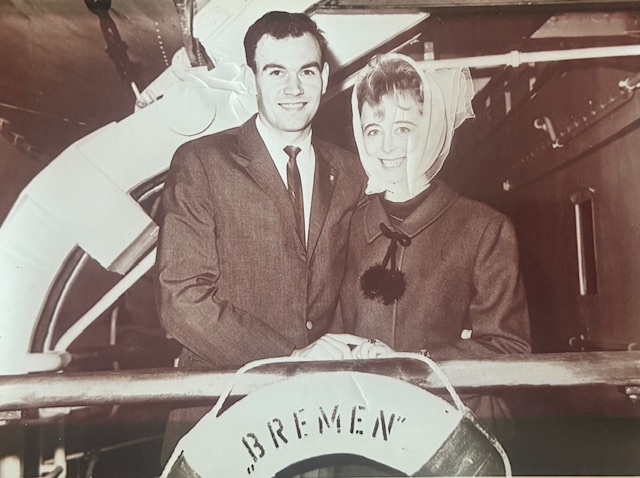Most of the time, you come to these TO THE POINT pages to read commentary or our musings over happenings in the farm machinery business. This blog ain’t one of those times.
No, there won’t be much of any actionable knowledge here you can use in your equipment business, or for your customers’ farming operations for that matter. But you see, when your name is on the door, you’re granted a certain leeway in editorial meetings. Or as my dad, Frank, taught me, you’re afforded certain rights when you buy ink by the barrel as we have for the past 40-some years.
Maybe I need to vent. And as I said in this space before, an industry that vents together, stays together. So, indulge me please.
Today’s rant, ladies and gentlemen, covers the runaway numbers of illegal immigrants in the U.S. The U.S. Customs and Border Protection offices estimate that border patrol encounters are in excess of 10-plus million (almost all at the southwest border with Mexico) over the last 4 years, a 3-fold increase vs. the previous administration.
And I guess I heard a little too much in recent weeks that got my Irish up (25% of my bloodline, by the way). For years now, there’s been little action other than sniping attacks on any fiscally responsible alternatives to the problems we’ve created for ourselves, and the people who voice such ideas. By the way, name any complicated social issue that’s ever been solved by throwing piles of money at it.
So yes, maybe I’m in a Scrooge-like state as the bleeding hearts take to the airwaves to cry about what the mean old President-Elect Trump is going to do about it. We can’t look the other way anymore, and it’s time to act.

Herwig & Monika Lepold aboard the S.S. Bremen bound for New York City, October 1964
Immigration Story: Close to Home
After Thanksgiving, my Univ. of Minnesota freshman Hayden (a Journalism major) recorded an insightful interview with my in-laws and German immigrants, Herwig and Monika Lepold. Herwig (Americanized as Harvey) came to the States (and Chicago) as a high-schooler in the mid-1950s with his parents aboard the historic General W. C. Langfitt military ship. After returning to attend trade school in the Motherland after high school, he emigrated from Germany for a second time, this time with his new bride, Moni, in 1964.
Hayden covered a lot of ground with his oma and opa (a 22-page transcript) and reinforced many of my views on immigration and how poorly the Biden Administration handled things. And it gave oxygen to an idea that perhaps even those speaking most vocally could get behind. More on that later.
The octogenarians say they did everything by the book back in their day. They applied to the U.S. Consulate in Germany for their green cards, showed proof of sponsoring settlers in their destination (Chicago), passed an onsite health inspection and had all their belongings inspected before they touched New York soil. There were quotas that were managed, and they came when they were given the green light.
They arrived at Harvey’s parents’ home in Chicago. Harvey found work as a draftsman, and Monika, who didn’t know any English at all, found work as a fur finisher, a trade she started at the age of 14 in Germany. Her coworkers at the fur shop insisted she speak English, and she was a quick learner.
“Name any complicated social issue that’s ever been solved by throwing piles of money at it…”
Times were different, some of you will say as I attempt a correlation to the current situation. But my in-laws were no strangers to hardship. Due to the war and their fathers both ending up in prison camps, Harvey didn’t meet his father until he was 4, Moni until she was 6. Poverty was a way of life. Harvey came over a few short years after World War II, when war refugee numbers were still swelling.
It was worse for Moni. Born to German parents in Yugoslavia, she was lucky to have made it out at all as a refugee and luckily avoided Russian-occupied territory in her migration with her mother and grandmother. At just 18 months old, she was a resident of Hungarian work camps, and later at a series of farms, wherever her mother could find field work one season at a time. They kept moving wherever the next season’s work could be found.
But upon arrival in the States, it was expected, both by them and by their community, that they would not be burdens to their new country or to those sticking their necks out for them.

Journalism Major Hayden Lessiter with Oma (Moni) and Opa (Harvey) at their Chicagoland home, 2024.
Like many immigrants, jobs were prearranged and some walked off the boat and into direct employment. How important was that support structure?
“It was very important,” says Moni. “When my in-laws came in the 1950s, the people who’d come before them looked out for them and made sure they had a nice place to stay. Having a job was most important, as was having the help when you don’t the know the language and making sure we got to things like social security registrations.”
Their newfound work friends helped Harvey and Moni find an affordable apartment, and to afford the TV that was so key to Moni’s language-learning. “I wanted to fit in here in America, to the language, the rules, the culture and the people,” she says. “And everybody was very helpful; I cannot complain at all about the way the Americans treated us.”
Fast Forward to Today
In my in-laws’ own hometown of Chicago, it’s been estimated that in the 2 years leading up to last June, Chicago spent $400 million on 42,000 migrants. That’s big-time waste even for the drunk-sailor-like city, among the most fiscally mismanaged in the nation.
Yet still there are calls from the left to “Trump-proof” cities, draw up new protections for illegals and threaten to drown everyone through lawyers and translators if illegals are arrested.
OK ... Get Up & Step Up
Here’s where I am today on it, in direct answer to the “bleeding hearts” trying to demonize the choices that new leadership now must make happen. I’ve concluded that the bleeding hearts will pursue the status quo on the topic -- until it’s their own blood at stake. Maybe they can prove us wrong.
Those who want to put their muscle where their mouth is can choose to step up. Open the doors of your home; give them your basement or guest rooms. Take them to church. Cook or allow them to use your kitchen. Teach them customs and culture. Make sure the kids get off to school. And personally walk them to the workplace, the foundries and the factories, the welding programs, the dairies and the fruit and produce growers, and all other vital businesses that remain at risk of failing over labor shortages. They can work, contribute and have the American dream, just like the previous generations.
“Bleeding hearts will pursue the status quo on immigration — until it’s their own blood at stake…”
I remember a few Laotian families at my church in the 1970s, which I assume was through some sort of program like that being suggested here. I never thought to ask but I’m guessing some sort of proactive support brought them to the Milwaukee area and helped them get rooted. I know one of those Laotian children is now a teacher and coach at the K-12 academy here in town.
Dreaming? Maybe. But I’m not even suggesting folks must do it out of kindness alone. Heck, we could pay handsomely for those willing to step up. And where will that come from? Easy. I’m willing to bet Elon Musk and the new Dept. of Government Efficiency could find the necessary dollars within 48 hours.
So those of you responding with red faces and defiant and crossed arms, here’s the question ... Are you prepared to make a sacrifice with your own resources to solve the problem? Or just continue to attack the new administration and snipe at every proposed idea? The mess is here to be cleaned up because the Biden Administration lacked the fortitude to quell it before it got out of hand.
I’ve never seen a big problem solved in any other way than by rolling up one’s sleeves and working the problems to death, so to speak. Sniping without acting allowed the problem to snowball. And we now have an avalanche, because of political cowardice.
Among our loyal Farm Equipment subscribers are some of the smartest and wisest businesspeople I’ve ever met. So you’re officially invited to vent-and-suggest in the commenting field below. Let us know how the problem can practically be solved.
After many years of experimentation with other ways of problem-solving, it appears that business and its problem-solving wisdom may have a voice once again.






